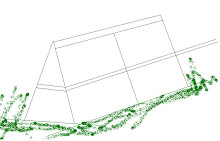I thought of something that, once it came into mind, seemed so incredibly obvious to me that I figure I must be stealing this from somewhere. There's been a lot of little stories about gerrymandering electoral districts and how some states want to divide electoral college votes in alignment with those gerrymandered districts. I was peacefully driving along the highway and wham-o! It hit me…
I remember back to my grade school days and our basic discussions about the three branches of the government, checks and balances, and the bicameral congress. The two chambers of congress were supposed to be different from one another. One was to be slower and moderating as each chunk of land (State) had the same strength of voice regardless of size, while the other was to be faster acting and more purely representative of the individual. The latter was to be the House of Representatives and, in my opinion, it doesn't represent us anymore. Or not all of us, anyway.
For one, on a simple average alone, each member of the House represents about 700,000 people. That's about the size of the City of Detroit. Also, it's about the size of the population of Alaska. It's slightly more than the population of Washington D.C. and around one-fifth of the population of Puerto Rico, but those two don't really matter since they don't get votes in our federal government…
If you want to continue with the simple average path, at the time of the Founding Fathers, representatives had about 30,000 people under them (excluding "Indians" and "other persons"). These representatives were to be apportioned among the several states. From that, no matter how metropolitan or rural areas actually functioned, Representatives were tied to state borders. This leads me to the real juicy center of the idea: State borders should not apply at all to the House of Representatives.
I live near Philadelphia, Pennsylvania. If you look at traffic patterns into and out of the city each morning during the news, there is a lot of connectivity between Camden and Philadelphia. Further, the suburbs are, obviously, more closely tied to the city than to the rural areas to the north and west of Philly. However, the Philly Suburb districts (PA-6, 8 and 15) grab up a lot of open space, all of which was at one time farmland and some still remains as such. How does one person represent the needs of the districts like those? I'd suspect it's an easier job to represent PA-5 to the northwest, which is the beautiful Pennsylvania Wilds (and oil country). At least that area is somewhat economically coherent.
So I'm completely aware that no matter what, representative government is going to be messy. But one thing that it still needs to do is be representative. That's just in the name. If it isn't representative, then it isn't representative. The fact that a government is reflective of the will of the people is essence of what it means to live in something other than a dictatorship. But we seem to want to make ourselves a separate entity from our government. "Them jerks in Washington..."
But I can empathize with the narrow minorities in districts all across the country that have been stripped of representation by congressional borders alone. Just having a representative doesn't mean a person is represented. Everyone had a Feudal Lord at one point too, but that didn't mean representation in the King's court.
So what? Remove the arbitrary state line boundaries and bound congressional districts by activity / economy / etc. Then, without the need for being part of a state but only being part of an American economic or cultural region, territories and non-state districts could finally have a voice in their government. At the outset, states could work together regionally to set up the districts and then they would be approved every ten years (two years after each census) by both Federal and State legislatures and executive branches… or something else to keep them from being modified to meet a political goal at the expense of honest representation. The Senate will still have two representatives per state, so it will remain a body that slows everything down (I mean that in a good way). And while we're at it, change the way the president is elected to straight popular vote. With different parameters on each part of the elected government electoral process, everyone is assured at least some voice in the government. And I think that even when the minority loses out, if we can say out loud that we believe the government is truly representative of the will of the Nation's people, we will be happier and less polarized than we are today.
I base all of this on nothing, of course. Like I said, I was just driving along and it hit me.
1 year ago
